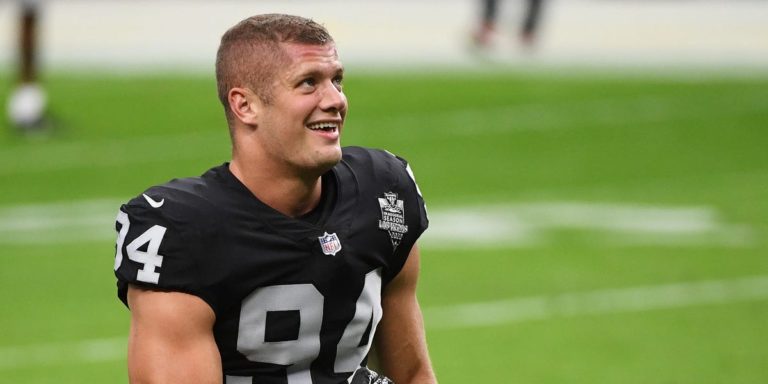
- Coming out is hard, yet millions and millions of ordinary people have done it.
- Pro sports is one of the last bastions of the closet, and only gay players can fix that.
- By coming out, Raiders DE Carl Nassib paves the way for other gay pro athletes to come out.
- This is an opinion column. The thoughts expressed are those of the author.
- See more stories on Insider’s business page.
Las Vegas Raiders defensive end Carl Nassib is gay, and his announcement of that fact makes him the first openly gay person on an active NFL team roster.
This is great. I’m happy for him that he has off his chest something he says he’s struggled for 15 years about how to say. And I’m thrilled for gay players in the NFL and on college teams — or who aspire to play in the NFL or on college teams — who may be wondering what will happen if they come out.
Nassib, who is in the middle of a three-year, $25 million contract, sends a strong message by coming out: You can be gay and play at the highest levels of this sport.
Now it’s time for others to follow his lead and come out, too.
The closet is bad
I understand that not every gay man is in a position to disclose his sexuality. Some people have good reason to fear they will be rejected by people they depend on emotionally or financially if they come out. Some have good reason to fear violence. And even when the risks are not so grave, coming out can still be hard. One of the injustices of homophobia is it can give people good reasons to hide parts of themselves.
At the same time, coming out is something that millions and millions of people have done, en masse, even in times when our society and its institutions were much less accepting than they are now. Every day, people come out at greater personal risk and with fewer resources than are available to a professional athlete who considers whether to come out.
So while I have compassion for people who find it hard to come out, I worry that fixating on the “difficulty” or “bravery“ associated with coming out can actually reinforce the appeal of the closet, by suggesting that a person must be extraordinary to manage coming out. In fact, ordinary people come out all the time. For some, it isn’t even that hard. But more importantly, it can be very rewarding, even for those who find it terrifying. How often do you hear people say they wish they had stayed in the closet?
And the closet isn’t just soul-crushing to the people who feel they must hide in it. It also sends a damaging message to others. When you hide your sexual orientation, you reinforce the idea that it is shameful to be gay, and that there are good reasons to hide it. Staying in the closet produces a negative externality by validating homophobia.
Which, again, is not to say that nobody ever has a valid reason to do stay in the closet. But these are factors to consider: Do I have an opportunity to help people with less power than me by coming out? Is my silence making harder for them to speak their truth? And how bad will it really be if I just tell my truth?
It’s great that Nassib reached the conclusion that this was time to come out — I expect he will feel happier, and he’s done a true service by making it easier for other players to make the jump after him. Now they should find their way to doing so.